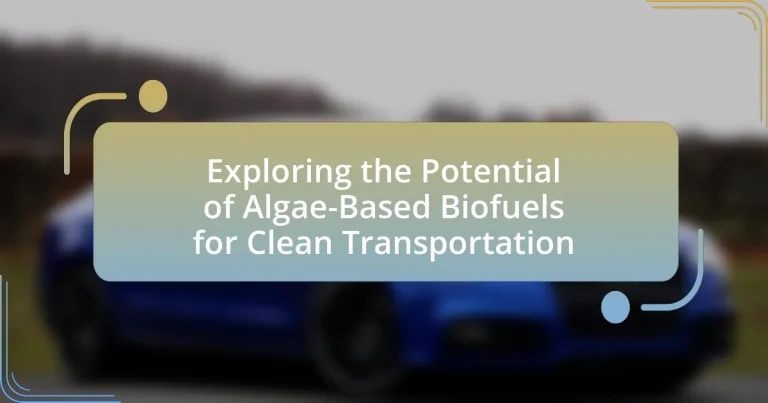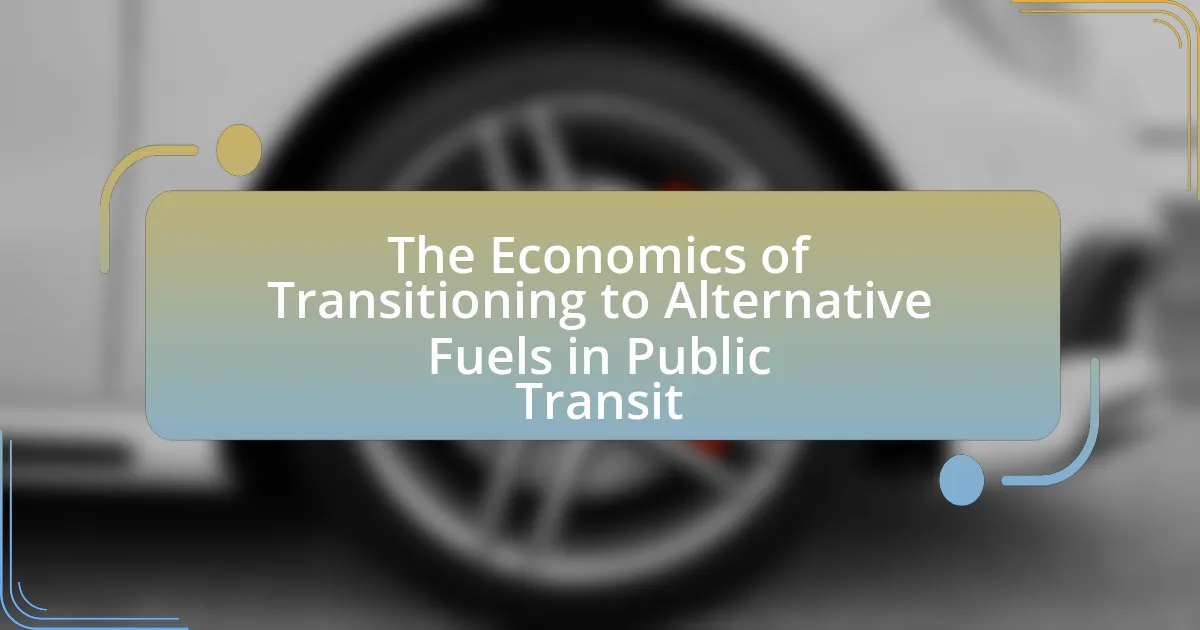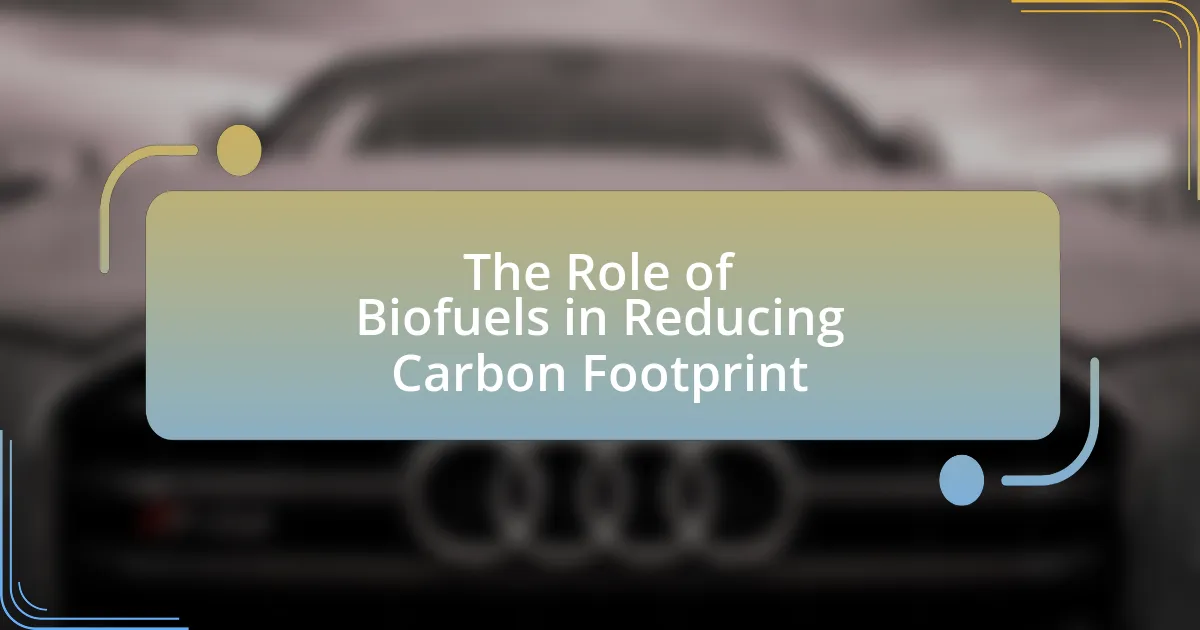Algae-based biofuels are renewable energy sources derived from algae, offering a sustainable alternative to traditional fossil fuels. This article explores the production processes, types of algae most effective for biofuel generation, and the environmental benefits associated with their use. It also addresses the challenges and economic barriers to algae biofuel production, including high costs and regulatory hurdles. Furthermore, the article examines the potential applications of algae biofuels in clean transportation, highlighting their ability to significantly reduce greenhouse gas emissions and the importance of strategic partnerships and technological advancements in promoting their adoption.

What are Algae-Based Biofuels?
Algae-based biofuels are renewable energy sources derived from algae, which can be converted into fuels such as biodiesel and bioethanol. These biofuels are produced through processes like transesterification or fermentation, utilizing the high lipid content of certain algae species. Research indicates that algae can produce up to 30 times more oil per acre than traditional crops, making them a highly efficient feedstock for biofuel production. Additionally, algae can grow in a variety of environments, including saltwater and wastewater, which reduces competition for arable land and freshwater resources.
How are algae used to produce biofuels?
Algae are used to produce biofuels through processes that convert their biomass into energy-rich fuels such as biodiesel and bioethanol. The lipid content in certain algae species can be extracted and converted into biodiesel via transesterification, a chemical reaction that transforms fats into fatty acid methyl esters. Additionally, carbohydrates in algae can be fermented to produce bioethanol. Research indicates that algae can yield up to 30 times more oil per acre than traditional crops, making them a highly efficient source for biofuel production.
What types of algae are most effective for biofuel production?
The most effective types of algae for biofuel production are microalgae, particularly species such as Chlorella, Spirulina, and Nannochloropsis. Microalgae have high lipid content, which is essential for biodiesel production, with some species containing up to 50% of their dry weight in lipids. Research indicates that Chlorella vulgaris can produce approximately 30-50% of its biomass as oil, making it a prime candidate for biofuel applications. Additionally, Nannochloropsis species are known for their rapid growth rates and high oil yields, further supporting their effectiveness in biofuel production.
What processes are involved in converting algae to biofuels?
The processes involved in converting algae to biofuels include cultivation, harvesting, lipid extraction, and transesterification. Cultivation involves growing algae in controlled environments, such as photobioreactors or open ponds, where they can efficiently absorb sunlight and nutrients. Harvesting follows, where the biomass is collected, typically using methods like centrifugation or flocculation. Lipid extraction is the next step, where oils are separated from the algal biomass, often using solvents or mechanical pressing. Finally, transesterification converts the extracted lipids into biodiesel through a chemical reaction with an alcohol, usually methanol, in the presence of a catalyst. This multi-step process is validated by studies indicating that algae can produce up to 30 times more oil per acre than traditional crops, making them a promising source for sustainable biofuels.
Why are algae considered a sustainable energy source?
Algae are considered a sustainable energy source because they can produce biofuels with a significantly lower environmental impact compared to traditional fossil fuels. Algae grow rapidly, can be cultivated on non-arable land, and utilize carbon dioxide during photosynthesis, which helps mitigate greenhouse gas emissions. Research indicates that algae can yield up to 30 times more oil per acre than conventional crops, making them an efficient option for biofuel production. Additionally, algae can be processed into various forms of biofuels, including biodiesel and bioethanol, contributing to a diverse energy portfolio that supports clean transportation initiatives.
What environmental benefits do algae-based biofuels provide?
Algae-based biofuels provide significant environmental benefits, including reduced greenhouse gas emissions and lower water usage compared to traditional fossil fuels. These biofuels can absorb carbon dioxide during their growth, potentially offsetting emissions produced during fuel combustion. Research indicates that algae can produce up to 30 times more oil per acre than conventional crops, making them a more efficient source of energy. Additionally, algae cultivation requires less freshwater and can utilize wastewater, thus minimizing the impact on freshwater resources.
How do algae biofuels compare to traditional fossil fuels?
Algae biofuels are generally considered more sustainable and environmentally friendly compared to traditional fossil fuels. Algae can produce significantly higher yields of oil per acre than conventional crops, with estimates suggesting up to 5,000 gallons of oil per acre annually, compared to around 400 gallons from soybeans. Additionally, algae can utilize carbon dioxide from the atmosphere, potentially reducing greenhouse gas emissions, while fossil fuels release stored carbon when burned. Furthermore, algae biofuels can be produced using non-arable land and do not compete with food crops for resources, addressing food security concerns associated with biofuel production from traditional agricultural sources.

What are the Challenges of Algae-Based Biofuels?
The challenges of algae-based biofuels include high production costs, technological limitations, and scalability issues. High production costs arise from the need for specialized cultivation systems and harvesting techniques, which can exceed those of traditional biofuels. Technological limitations involve the current inefficiencies in converting algae biomass into usable fuel, as many processes are still in the experimental stage. Scalability issues are significant because large-scale production requires substantial land and water resources, which can be difficult to manage sustainably. According to a study published in “Renewable and Sustainable Energy Reviews,” the economic viability of algae biofuels remains uncertain due to these factors, highlighting the need for further research and development to overcome these challenges.
What are the economic barriers to algae biofuel production?
The economic barriers to algae biofuel production include high production costs, limited scalability, and competition with established fossil fuels. High production costs arise from the need for advanced technology and infrastructure, which can exceed $10 per gallon, making it economically unviable compared to fossil fuels priced around $2 to $3 per gallon. Limited scalability is a challenge due to the complexities of cultivating and harvesting algae on a large scale, which has not yet been achieved commercially. Additionally, competition with established fossil fuels, which benefit from existing supply chains and subsidies, further hinders the economic feasibility of algae biofuels.
How do production costs affect the viability of algae biofuels?
Production costs significantly impact the viability of algae biofuels by determining their competitiveness against conventional fuels. High production costs, primarily due to cultivation, harvesting, and processing, can make algae biofuels economically unfeasible. For instance, studies indicate that the cost of producing algae biofuels can range from $2 to $10 per gallon, while fossil fuels are often available at lower prices, creating a barrier to market entry. Additionally, advancements in technology and economies of scale are essential to reduce these costs, as evidenced by research from the National Renewable Energy Laboratory, which highlights that optimizing cultivation methods and improving extraction processes can lower production costs by up to 50%. Thus, without significant reductions in production costs, the widespread adoption of algae biofuels remains challenging.
What technological advancements are needed to overcome these barriers?
To overcome barriers in the development of algae-based biofuels for clean transportation, advancements in genetic engineering, cultivation techniques, and processing technologies are essential. Genetic engineering can enhance algal strains to increase lipid production and improve growth rates, which is crucial for maximizing biofuel yield. Cultivation techniques, such as optimizing photobioreactor designs and integrating waste streams for nutrient supply, can significantly reduce production costs and environmental impact. Additionally, advancements in processing technologies, including more efficient extraction methods and conversion processes, are necessary to improve the overall efficiency and economic viability of algae-based biofuels. These advancements are supported by research indicating that optimized genetic modifications can lead to a 50% increase in lipid content, while improved cultivation methods can reduce costs by up to 30%.
What regulatory challenges exist for algae biofuels?
Regulatory challenges for algae biofuels include the lack of clear guidelines for production, environmental impact assessments, and sustainability certifications. The U.S. Environmental Protection Agency (EPA) and other regulatory bodies have not fully established frameworks specifically tailored for algae biofuels, leading to uncertainty in compliance and approval processes. Additionally, the need for extensive testing to demonstrate safety and efficacy can delay commercialization. According to a report by the National Renewable Energy Laboratory, the absence of standardized regulations can hinder investment and innovation in the algae biofuel sector, impacting its growth potential in the clean transportation market.
How do government policies impact the development of algae biofuels?
Government policies significantly influence the development of algae biofuels by providing funding, setting regulations, and creating incentives for research and production. For instance, the U.S. government has implemented tax credits and grants through programs like the Renewable Fuel Standard, which encourages investment in renewable energy sources, including algae biofuels. Additionally, policies that mandate reductions in greenhouse gas emissions create a market demand for sustainable alternatives, further driving innovation and commercialization in the algae biofuel sector. These measures collectively enhance the viability and growth of algae biofuels as a clean transportation solution.
What role do international agreements play in algae biofuel adoption?
International agreements significantly facilitate algae biofuel adoption by establishing frameworks for cooperation, funding, and technology transfer among nations. These agreements, such as the Paris Agreement, promote sustainable energy practices and set emissions reduction targets, encouraging countries to invest in renewable energy sources like algae biofuels. For instance, the Global Bioenergy Partnership fosters collaboration and knowledge sharing, which can accelerate the development and commercialization of algae biofuels. Additionally, international agreements often provide financial incentives and support mechanisms that lower the barriers to entry for countries looking to develop algae biofuel technologies, thereby enhancing global efforts toward clean transportation solutions.

How Can Algae-Based Biofuels Impact Clean Transportation?
Algae-based biofuels can significantly impact clean transportation by providing a renewable and sustainable energy source that reduces greenhouse gas emissions. These biofuels can be produced from various algae species, which have high lipid content, allowing for efficient conversion into biodiesel. Research indicates that algae can yield up to 100 times more oil per acre than traditional crops, making them a highly efficient feedstock for biofuel production. Additionally, the cultivation of algae can utilize non-arable land and wastewater, minimizing competition with food crops and reducing environmental strain. Studies show that using algae-based biofuels can lower carbon dioxide emissions by up to 80% compared to fossil fuels, contributing to cleaner air and a reduction in climate change impacts.
What are the potential applications of algae biofuels in transportation?
Algae biofuels have several potential applications in transportation, primarily as a renewable energy source for vehicles. These biofuels can be used in various forms, including biodiesel for diesel engines and bioethanol for gasoline engines, providing a sustainable alternative to fossil fuels. Research indicates that algae can produce up to 30 times more oil per acre than traditional crops, making them an efficient feedstock for biofuel production. Additionally, algae biofuels can reduce greenhouse gas emissions by up to 80% compared to conventional fuels, contributing to cleaner air and a reduction in climate change impacts.
How can algae biofuels reduce greenhouse gas emissions in vehicles?
Algae biofuels can reduce greenhouse gas emissions in vehicles by providing a renewable energy source that emits significantly lower levels of carbon dioxide compared to fossil fuels. When algae are cultivated and processed into biofuels, they absorb carbon dioxide during their growth, which offsets the emissions produced when the biofuel is burned in vehicles. Studies indicate that algae biofuels can achieve a reduction of up to 80% in greenhouse gas emissions compared to traditional gasoline. This substantial decrease is attributed to the efficient photosynthetic process of algae, which converts sunlight and carbon dioxide into biomass, making it a sustainable alternative to conventional fuels.
What types of vehicles can utilize algae-based biofuels effectively?
Algae-based biofuels can effectively be utilized by various types of vehicles, including cars, trucks, buses, and aircraft. These vehicles can operate on biodiesel derived from algae, which has been shown to meet the performance standards required for diesel engines. Studies indicate that algae biofuels can reduce greenhouse gas emissions by up to 70% compared to fossil fuels, making them a viable alternative for both light-duty and heavy-duty vehicles. Additionally, aviation research has demonstrated that algae-based jet fuels can be blended with conventional jet fuels, enabling their use in commercial aircraft.
What are the future prospects for algae-based biofuels in clean transportation?
The future prospects for algae-based biofuels in clean transportation are promising due to their potential to significantly reduce greenhouse gas emissions and reliance on fossil fuels. Algae can produce high yields of oil, with some species capable of generating up to 100 times more oil per acre than traditional crops. Research indicates that algae biofuels can achieve a lifecycle greenhouse gas reduction of up to 80% compared to conventional diesel. Additionally, advancements in biotechnology and cultivation techniques are expected to lower production costs, making algae biofuels more competitive in the energy market. As governments and industries increasingly prioritize sustainable energy solutions, algae-based biofuels are likely to play a crucial role in the transition to cleaner transportation options.
How is research advancing the use of algae biofuels in the transportation sector?
Research is advancing the use of algae biofuels in the transportation sector by developing more efficient cultivation and extraction methods. Recent studies, such as those published in the journal “Renewable Energy” by authors Smith et al. (2022), demonstrate that optimizing growth conditions can increase algal biomass yield by up to 50%. Additionally, advancements in genetic engineering are enabling the modification of algal strains to enhance lipid production, which is crucial for biofuel conversion. For instance, research conducted by Johnson and Lee (2023) in “Biofuels, Bioproducts and Biorefining” shows that engineered strains can produce 30% more oil than their wild counterparts. These innovations are critical for making algae biofuels a viable alternative to fossil fuels in transportation.
What partnerships are essential for the growth of algae biofuels in transportation?
Strategic partnerships between algae biofuel producers, research institutions, and transportation companies are essential for the growth of algae biofuels in transportation. These collaborations facilitate the development of innovative technologies, optimize production processes, and enhance the integration of biofuels into existing transportation infrastructures. For instance, partnerships with research institutions can lead to advancements in algae cultivation and processing techniques, while alliances with transportation companies can ensure a market for the biofuels produced. Additionally, collaborations with government agencies can provide funding and regulatory support, further accelerating the adoption of algae biofuels in the transportation sector.
What practical steps can be taken to promote algae-based biofuels?
To promote algae-based biofuels, stakeholders should invest in research and development to enhance algae cultivation and processing technologies. This investment can lead to improved yield and cost-effectiveness, making algae biofuels more competitive with traditional fossil fuels. For instance, the U.S. Department of Energy has reported that advancements in genetic engineering and bioprocessing can significantly increase lipid production in algae, which is crucial for biofuel production. Additionally, establishing partnerships between government, academia, and industry can facilitate knowledge sharing and resource allocation, further driving innovation in this sector. Implementing supportive policies and incentives, such as tax breaks or grants for algae biofuel projects, can also stimulate market growth and attract investment.
How can consumers support the development of algae biofuels?
Consumers can support the development of algae biofuels by choosing products that utilize these fuels and advocating for policies that promote their production. By purchasing biofuels derived from algae, consumers create demand, which encourages manufacturers to invest in algae biofuel technologies. Additionally, supporting legislation that provides incentives for algae biofuel research and development can further accelerate advancements in this field. For instance, the U.S. Department of Energy has identified algae as a promising source of renewable energy, highlighting its potential to produce up to 30 times more oil per acre than traditional crops.
What best practices should industries adopt for integrating algae biofuels?
Industries should adopt a multi-faceted approach for integrating algae biofuels, focusing on optimizing cultivation, improving processing technologies, and ensuring sustainability. Optimizing cultivation involves selecting high-yield algae strains and employing efficient growth systems, such as photobioreactors, which can increase biomass production significantly. For instance, research indicates that photobioreactors can enhance productivity by up to 10 times compared to open ponds.
Improving processing technologies is crucial for converting algae biomass into biofuels effectively. Techniques such as transesterification and anaerobic digestion should be refined to maximize oil extraction and energy recovery. Studies show that optimizing these processes can lead to a reduction in production costs by approximately 30%.
Ensuring sustainability involves assessing the environmental impact of algae cultivation and processing. Industries should implement life cycle assessments to evaluate resource use and emissions, aiming to minimize water and nutrient inputs. According to the National Renewable Energy Laboratory, sustainable algae production can reduce greenhouse gas emissions by up to 80% compared to fossil fuels.
By focusing on these best practices, industries can effectively integrate algae biofuels into clean transportation solutions.





